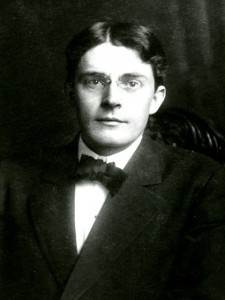By James Stimpert (Johns Hopkins University Hub, 8/11/2016)
A rather unusual permit application resides in the Records of the Office of the President in the Johns Hopkins University Archives.

James B. Watson’s “Permit to Purchase Intoxicating Liquor, etc., for Other Than Beverage Purposes” (1920) (Johns Hopkins University Archives)
In April 1920, Professor John B. Watson, a psychologist credited as the father of behaviorism, applied for a permit to purchase 34 gallons of rye whiskey for “scientific research for educational purposes.” He wished to research the effects of alcohol on human functions, which might not seem surprising—except for the fact that Prohibition had become the law of the land just three months earlier.
It was illegal to “manufacture, sell, barter, transport, import, export, deliver, or furnish any intoxicating liquor except as authorized,” though consuming alcohol was not prohibited. Watson had to apply to the Office of the Federal Prohibition Commissioner for permission to obtain alcohol for use in his lab.
Watson apparently obtained the desired whiskey from the Pikesville Distillery. Alongside the permit is May 1920 correspondence with Watson’s colleague, Professor Edward Thorndike, who had conducted similar experiments. Watson outlined his plan and solicited Thorndike’s views, to which Thorndike responded, “I think your experiment is a very beautiful one indeed.”
In a comment to Thorndike, Watson describes having subjects throw darts from a certain distance over several hours, while he studied their performance as they consumed alcohol. He observed that, “One or two of the individuals became practically drunk, but apparently the drunker they got the better they shot!”
Continue reading at the Johns Hopkins University Hub.
